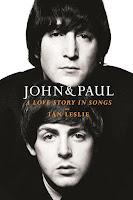
Ian Leslie's John & Paul: A Love Story in Songs is a terrific book. I say that as a major Beatles fan, though not, as I've confessed before, a fanatic. I may have collected and listened to everything Paul McCartney has ever officially released, but I haven't done the same with John Lennon (much less George Harrison or Ringo Starr), and that's a failure on my part. Particularly when it comes to John, I need to correct that someday.
Why? Because as I think Leslie demonstrates very well in this book, constructing any history of the Lennon & McCartney musical partnership--both before and after the Beatles--which doesn't put their complicated, deeply loving, often deeply resentful, and always deeply confusing relationship at the center almost certainly misses something crucial. That's not to say Leslie does something here that has never been done before; any remotely attentive take on the lives of these two individuals--or at least their lives between 1957 and 1980, and the art they made during those years, both together and apart and with others--can't help but notice how much John and Paul, no matter what else is going on or who else is there, are looking at and to one another, seeking approval from the other, trying to one-up one another, listening to and trusting in each other. I took that away as perhaps the defining revelation of Peter Jackson's wonderful reconstruction of the Let It Be sessions, The Beatles: Get Back, and I know I'm not alone in thinking that way.
But Leslie provides the supporting evidence of the abiding artistic importance of all of John and Paul's looking, listening, seeking, competing, and trusting. Some of the songs he builds chapters around are, admittedly, a bit of stretch; he tells the story of these two artists chronologically, and finding the right song from the particular stretch of their lives he is chronicling (sometimes just a few weeks, sometimes several months) to match what he wants to say about respective artistic and personal as well as their relationship's evolution(s) doesn't always work. But there were so many times when the product of the Lennon & McCartney songwriting partnership reflected exactly what appears to have been going on in their hearts and heads that, more often than not, the songs Leslie chooses for each chapter work very well, sometimes perfectly. (I'll never think about "If I Fell" or "In My Life" or Lennon's "God" the same way again--and it's not a coincidence that these were all John songs: while Leslie's admiration for Paul is endless, he makes a strong case that the brilliant and damaged John was always the force that did more to captivate or infuriate or drive forward Paul as an artist, and the Beatles as a band, than was the case for any other single member.)
Anyway, this is a first-rate work of both popular biography and musical criticism; I have to set it alongside Rob Sheffield's Dreaming the Beatles as the best book I've ever read about that band, despite its limitations (he puts an official apology at the end of the book, expressing regret that, because of his thesis--as defensible and correct as I think it is--George Harrison and Ringo Starr get pushed aside). Check it out, if you're any kind of fan of the 1960s at all; you're learn something from it, and maybe be inspired by it too.
